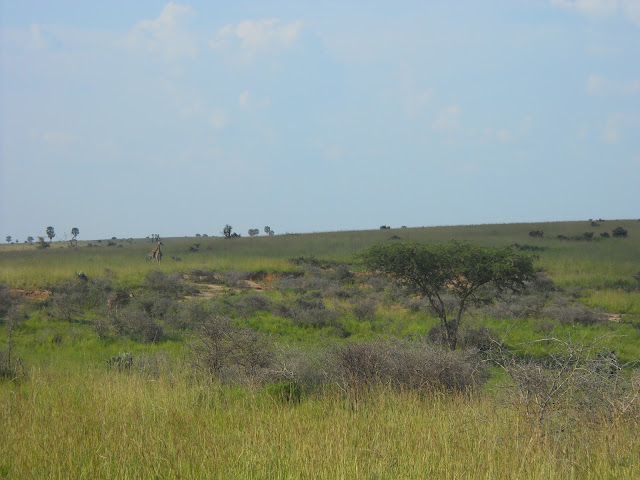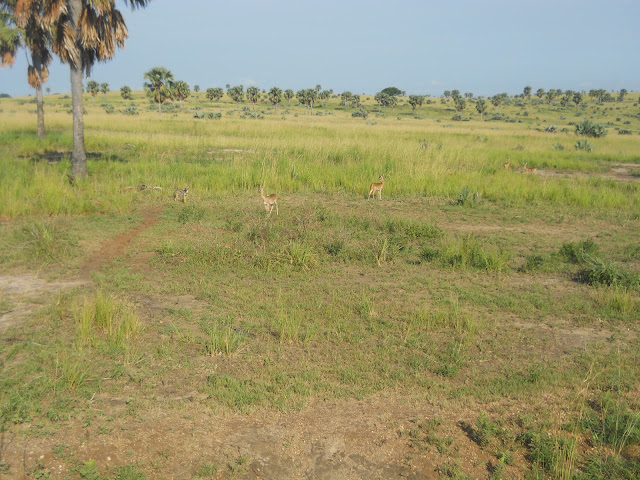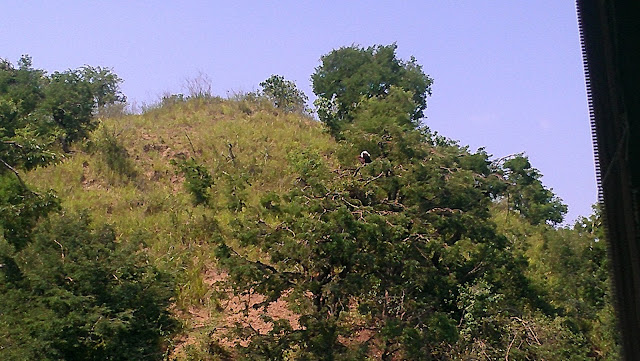So, Murchison Falls!
I had a hard time dealing with the money aspect of it, I
think because I didn’t feel like I had a lot of money growing up. We maybe went
on one big trip a year as a family, stayed in-state and saved up the whole year
to do that. There were years when not all of us went. Murchison was an
all-inclusive (except for some meals) trip, and so it felt strange that I gave
a large sum of money at the beginning, and then everything else was the
responsibility of our guide. I’m glad we did that, because it took any
timing/driving/permit responsibility away from us, but at the same time (as
I’ve mentioned in previous posts), not having control was strange.
I only thought about this after the fact – our guide gave us
no emergency numbers, no instructions should he suddenly have a heart attack or
otherwise be incapacitated. We saw no emergency medical centers nor were they
mentioned, and I’m pretty sure there was no med-evac to come for us should
something go wrong. There were other cars in the park that day, but I’m unsure
what would have happened had they come upon some problem – the people in those
cars paid for a safari, not a rescue mission, and helping someone would
definitely infer speeding through the park, not stopping for picture. We
actually encountered this problem in a
lighter way – a few people working at a ranger post wanted to get a ride with
us to a different place in the park. Our guide explained we would be moving too
slow for them, and stopping to take pictures. At this point I also didn’t want
them to ride with us. I felt a sense of ownership of our car, that we had paid
a large sum of money to be alone, in our car, not giving rides to park workers.
This didn’t make me feel good after thinking it.
At this point I felt like an outsider, like a tourist.
Because anywhere else in Uganda, people do this. People stop and give other
people rides; that is the culture. But it felt like a different world inside
the park, like we were truly foreigners, because only foreigners would decline
to give a ride to someone else.
Being in the park also made me think about what we term
exotic, in that African animals are exotic because they don’t live in temperate
or seasonal climates. Whereas to Africans, bears, raccoons, etc are exotic
because those animals cannot live on the equator. We have this idea that
African animals live in this ‘other’ place, that is not natural or normal, that
is basically the Lion King. There was an Onion article a while ago (or maybe a
real article) stating that most Americans think of Africa as one big game
reserve, which is definitely not true. But not many Africans take safaris to
North America to see our animals, or Europe either.
Another thing I noticed was the overall lack of noise.
Compared to America, Uganda is a very noisy place. I say this not having lived
in large cities such as New York or Chicago, which I assume are noisy
constantly. But in the sort of suburban, small city life I grew up with, noise
in public was generally kept to a minimum. The guy with the subwoofers in his
trunk was the exception, not the rule.
In Uganda, music especially is woven into every part of
life. If you can get speakers and power, you play music. This often results in
dueling tunes, as well as any music coming from cars, people shouting,
livestock making a lot of noise (even in towns), etc.
Inside the park, no cars are allowed to play music, and you
as a driver are not allowed to honk your horn (in Uganda this is called hooting).
So in that sense you believe you have maybe left Uganda, or are in a different
country all together. The only sounds come from the animals, and from the
conversations you have with your car-mates and your guide/driver. It reminded
me of when my family would take our trips up North each year. Sure, we would
play music for a while, but eventually we would fall asleep and silence would
fall. Even when we reached our campground, there were minimal noises outside
the forest, and you truly believed you had ‘gotten away.’
The park was also not always named Murchison Falls. It was
originally named Kabalega National Park, after the Omukama (like a king) of the
Bunyoro Kingdom, which was a pretty powerful kingdom between the 13th
and 19th centuries. Kings still exist in Uganda but have mostly
symbolic and cultural significance now, versus lawmaking or judicial powers.
The park takes its name from Roderick Murchison, a guy who
has frankly a lot of things named after him on Earth (and a crater on the
moon). He was mainly a geologist, and at the time the park was named was
President of the Royal Geological Society (round abouts 1863). But who did the
naming you may ask? Murchison himself never made it to the park which bears his
name, but instead it was one of few women explorers in Uganda in the late 1800s
who named the waterfall (and later the park took the name). She was called
Florence Baker, a Hungarian woman who had been sold as a slave to one of the
men heading the expedition, Samuel Baker. She actually ended up marrying this
guy, which is probably one of the most severe cases of Stockholm Syndrome ever.
I tell you all of this to say this: the name of this park
reflects a story that has nothing to do with the place itself. I asked our
guide before I had done any of this research what he thinks about the name, and
whether it should be changed back. He sort of shrugged and gave a non-answer. I
wasn’t sure if this was because he was supposed to toe the line in terms of
what the government should or shouldn’t be doing, or if he truly didn’t care.
From our conversations, he does a lot of safaris year round, so the name isn’t
stopping him from making a living.
But on the heels of President Obama returning the original
name of the Alaskan mountain Denali, it makes me ask: Do names matter? Does the
answer to that question depend on your culture?
Congo is another example of places which were all renamed
after the Belgians fled. The government felt it important to have names that
reflected the people who lived there, not the people who came later.
In my home state of Michigan, there are many places which
still bear Native American names, but at the same time places have French,
Dutch, English, or German names. The names of the natives mixed with the names
of the colonists. And that’s true in Uganda as well. There are plenty of things
named in local languages which hold their history tight to their chest.
Maybe you skipped all this to see the pictures, and that’s
okay too. But I hope at least some of this makes you think – what’s in a name?






















































































































































































































































































































































































































































